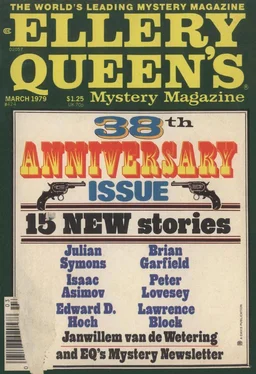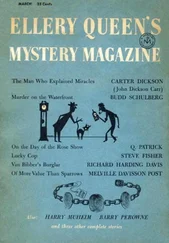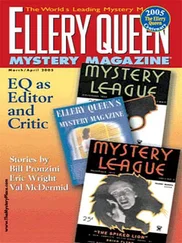Isaac Asimov - Ellery Queen’s Mystery Magazine, Vol. 73, No. 3. Whole No. 424, March 1979
Здесь есть возможность читать онлайн «Isaac Asimov - Ellery Queen’s Mystery Magazine, Vol. 73, No. 3. Whole No. 424, March 1979» весь текст электронной книги совершенно бесплатно (целиком полную версию без сокращений). В некоторых случаях можно слушать аудио, скачать через торрент в формате fb2 и присутствует краткое содержание. Город: New York, Год выпуска: 1979, ISBN: 1979, Издательство: Davis Publications, Жанр: Детектив, на английском языке. Описание произведения, (предисловие) а так же отзывы посетителей доступны на портале библиотеки ЛибКат.
- Название:Ellery Queen’s Mystery Magazine, Vol. 73, No. 3. Whole No. 424, March 1979
- Автор:
- Издательство:Davis Publications
- Жанр:
- Год:1979
- Город:New York
- ISBN:ISSN: 0013-6328
- Рейтинг книги:3 / 5. Голосов: 1
-
Избранное:Добавить в избранное
- Отзывы:
-
Ваша оценка:
- 60
- 1
- 2
- 3
- 4
- 5
Ellery Queen’s Mystery Magazine, Vol. 73, No. 3. Whole No. 424, March 1979: краткое содержание, описание и аннотация
Предлагаем к чтению аннотацию, описание, краткое содержание или предисловие (зависит от того, что написал сам автор книги «Ellery Queen’s Mystery Magazine, Vol. 73, No. 3. Whole No. 424, March 1979»). Если вы не нашли необходимую информацию о книге — напишите в комментариях, мы постараемся отыскать её.
Ellery Queen’s Mystery Magazine, Vol. 73, No. 3. Whole No. 424, March 1979 — читать онлайн бесплатно полную книгу (весь текст) целиком
Ниже представлен текст книги, разбитый по страницам. Система сохранения места последней прочитанной страницы, позволяет с удобством читать онлайн бесплатно книгу «Ellery Queen’s Mystery Magazine, Vol. 73, No. 3. Whole No. 424, March 1979», без необходимости каждый раз заново искать на чём Вы остановились. Поставьте закладку, и сможете в любой момент перейти на страницу, на которой закончили чтение.
Интервал:
Закладка:
He was just starting his fifteenth Avis Crystal bestseller at that time, and was still enjoying the fruits of his pedestrian labors, which included a mansion on ten acres of lush woodland, a couple of expensive cars, a cook, and a gardener. So all around it was a nice setup for me. I kept the house running smoothly, typed up his rough drafts, handled his correspondence, and encouraged him to write the G.A.N. But Great American Novels are written by great American writers, and I found out pretty quickly that Avery Curtis wasn’t one of those and never would be. And after a few more years he apparently came to the same conclusion, because his disposition, none too pleasant to begin with, took a turn for the worse, and he started to drink heavily.
I took the brunt of his ill-nature, and it wasn’t long before I stopped merely tolerating him and began to actively loathe him. And to wish him dead. Not at some indefinite when-the-time-comes date, but soon. Very soon.
I knew I was his sole beneficiary, because over the past years, when he’d come to depend heavily on me, he used the inheritance bait as a lever to keep me with him. But at 68, in spite of his excessive drinking and smoking, he was in good physical shape, and I could see the years stretching ahead, with me getting older and Uncle Avery getting meaner, and any way you looked at it, it was an ugly picture.
So when I came into his study one afternoon and found that short paragraph on top of the other typed sheets of yellow copy paper, the idea started forming with the gathering momentum of an avalanche.
Because, you see, that paragraph of Gothic prose was a perfect suicide note. Absolutely perfect.
And the conditions were perfect, too. I glanced over at Uncle Avery, snoring loudly on the couch, off on another of his monumental benders. He was out for the count. And Mrs. Herman, the cook, was off for the day. Uncle Avery and I were alone in the house.
First of all, although my fingerprints were all over the place, I realized I couldn’t superimpose them over his. So I went into the kitchen and got a pair of thin plastic utility gloves.
Then I went back and re-read the paragraph:
I can’t face any more of this. I thought life had so much more to offer me, but it’s become a travesty — meaningless, empty. I can see no reason for going on with it. I’m sorry, sorry for everything.
As I said, absolutely perfect, especially considering Uncle Avery’s situation and state of mind, which I’d be sure to reveal in full. I looked at the sheets underneath and saw that it was supposed to be stream of consciousness — the heroine mooning about her trouble and turmoil — and wondered why he’d taken it out of the machine with the page unfinished. Probably to crush it and throw it away, except that the need for a drink intervened. Well, I’d roll it back in, first making sure to destroy the preceding few pages so there’d be no continuity to give anything away. Fortunately he didn’t number the rough-draft pages, which used to annoy me, but now it worked in my favor.
Of course they might suspect that I’d typed the note myself, but only his fingerprints would be on the keys and on the paper, and I was pretty sure there was some way they could tell about different styles of typing — pressure and touch, or some such thing. So that was all right.
I went upstairs and got his vial of sleeping capsules. I had no idea how many would constitute a lethal dose, but I knew they were deadly in combination with alcohol, and he was sodden right now. I emptied all ten of them into a large glass, filled it halfway with Scotch, stirred it until the powder was dissolved, and added ice. I tasted it with a teaspoon and spat it out into the sink. It didn’t taste of anything but straight Scotch. I made a drink for myself, put both glasses on a tray with some ice and the Scotch bottle, and carried it into the study.
I set down the tray and brought the phone over to the couch.
“Uncle Avery.” I shook his shoulder. “ Avery. Telephone. Ed Grimes.”
He came awake slowly — surly, befuddled, and belligerent.
“Telephone,” I shouted. “Ed Grimes — your agent.” I held out the receiver.
“Hell with’m,” he muttered. “Call’m back.”
Well, that was easier than telling him Grimes would get tired of waiting and hang up. I replaced the receiver and helped him to a sitting position.
“I made us drinks,” I said. “We’ll be eating in half an hour.” I handed him the glass.
“My God, I’m thirsty.”
I watched as he drained the glass. And then, unaccountably, I started to go to pieces. I did it, I thought, my heart pounding. It’s done. He’s finished. I needed a drink badly now, and I reached for my glass, my hand shaking so badly that I had trouble getting it to my mouth.
Uncle Avery didn’t notice.
“Make me another one, like a good girl,” he mumbled.
But I wanted that glass the way it was, with the dregs of the powder in it. So I said, “All right, but let’s get you comfortable first.” I heaved him back into a lying position, and within a few moments he was snoring again. I wanted another drink myself, but I knew I had to keep my head clear. I put on the plastic gloves and wiped off his glass and pressed his fingers around it several times. I did the same with the vial of sleeping pills, and put both of them on the floor next to the couch. I rolled the “suicide note” into the typewriter and peeled off the top five pages of the manuscript draft for burning.
And that was it. I couldn’t think of anything else — couldn’t think at all, at that point. So I burned the papers, flushed the ashes down the sink, and dragged myself upstairs. Not to sleep, but to lie awake and watch the clock and wonder feverishly if I’d overlooked anything.
They had all left, the whole milling throng of them, but Chief of Police Holbrook was still there, rubbing my nerves raw.
“Let’s go over it once more, Mrs. Marlin,” he said quietly.
So I gritted my teeth and went through the whole business again — Uncle Avery’s bitterness at his success, the disintegration of his personality, the drinking bouts, and finally his banishing me from the study last night, refusing dinner, and my discovery of his body and the suicide note that morning.
He still held the yellow sheet of paper, now encased in plastic, in his hand. He kept glancing at it, frowning, and re-reading it. It was driving me crazy.
“I didn’t type that thing, if that’s what’s on your mind,” I blurted, and could have bitten off my tongue.
He looked at me thoughtfully. “No one’s suggesting you did, Mrs. Marlin. But even assuming that it’s established that Mr. Curtis did in fact type this paper, there’s something about it that bothers me.”
Here it comes, I thought. “What exactly bothers you, Chief?” I said.
“Well, now, for one thing,” he said, “this doesn’t strike me as the kind of letter a man would write — even a suicidal man. It’s a little too flowery, too high-flown, if you see what I mean. More like what a woman might write, seems to me.”
“Uncle Avery was that kind of writer,” I said. “He was steeped in that type of lavender prose. He wrote so much of it that he started to talk that way, even think that way. It’s perfectly compatible with his personality, after all these years.”
“Mmm. Don’t know much about writing, myself, especially the kind he wrote. My wife reads that stuff — I lean more toward the detective-type yarn — my line of work, after all.” He chuckled.
I managed a strained smile, but couldn’t think of anything to say.
He walked to the desk and bent over the pile of manuscript draft. “Eyes aren’t what they used to be,” he said, and fished out his glasses. He riffled through the top few pages. “Certainly sounds like his style. Although that could work both ways, of course. Could be that this was a part of the book he was working on.
Читать дальшеИнтервал:
Закладка:
Похожие книги на «Ellery Queen’s Mystery Magazine, Vol. 73, No. 3. Whole No. 424, March 1979»
Представляем Вашему вниманию похожие книги на «Ellery Queen’s Mystery Magazine, Vol. 73, No. 3. Whole No. 424, March 1979» списком для выбора. Мы отобрали схожую по названию и смыслу литературу в надежде предоставить читателям больше вариантов отыскать новые, интересные, ещё непрочитанные произведения.
Обсуждение, отзывы о книге «Ellery Queen’s Mystery Magazine, Vol. 73, No. 3. Whole No. 424, March 1979» и просто собственные мнения читателей. Оставьте ваши комментарии, напишите, что Вы думаете о произведении, его смысле или главных героях. Укажите что конкретно понравилось, а что нет, и почему Вы так считаете.












